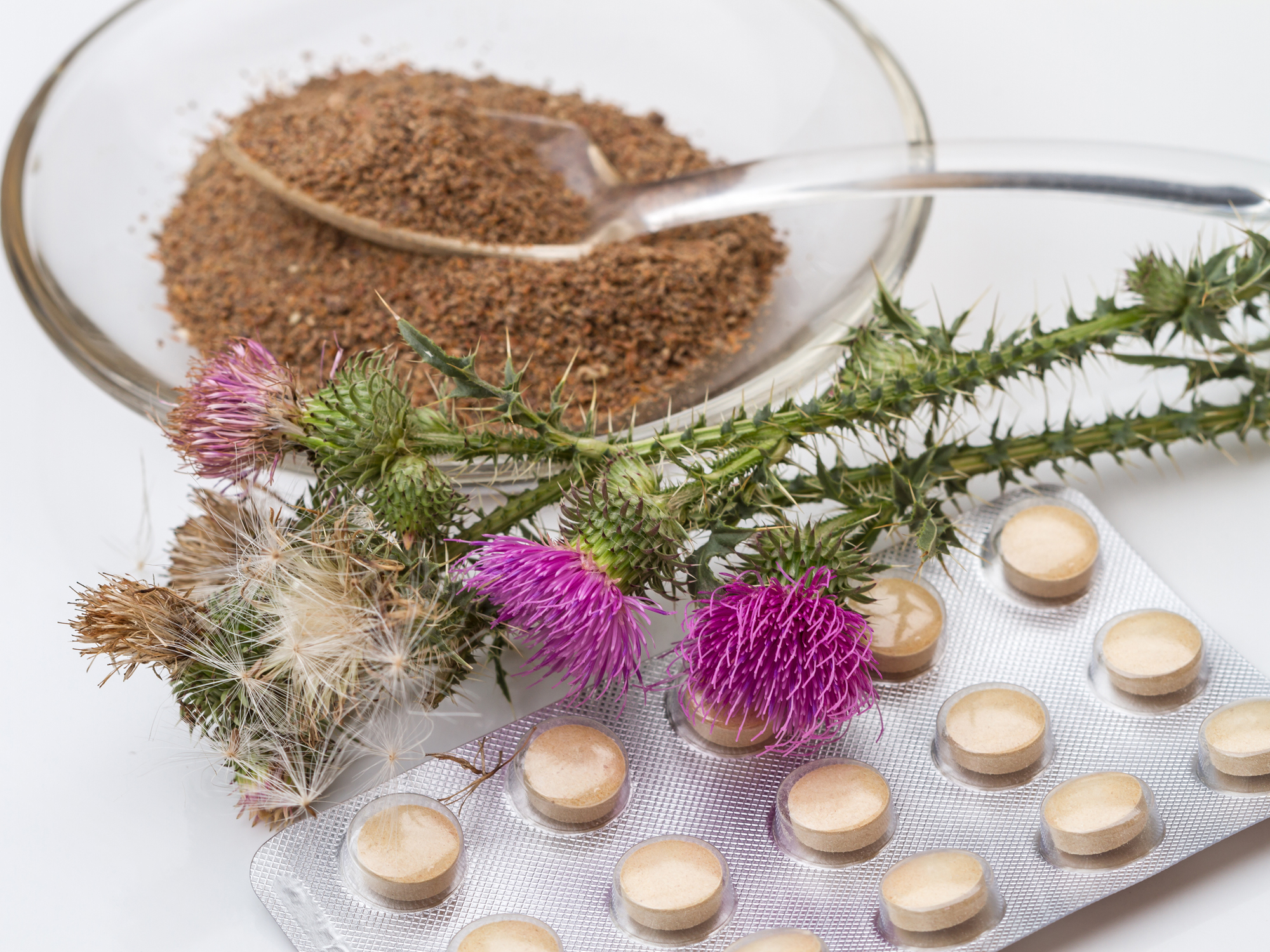Get Easy Health Digest™ in your inbox and don’t miss a thing when you subscribe today. Plus, get the free bonus report, Mother Nature’s Tips, Tricks and Remedies for Cholesterol, Blood Pressure & Blood Sugar as my way of saying welcome to the community!
Milk thistle: All-in-one superherb

When it comes to botanicals, there’s no such thing as a magic bullet — one herb that supports all aspects of health.
However, there are many which are known for their versatility and wide range of benefits. One of these is milk thistle.
This is not a new discovery; milk thistle has a long history of therapeutic use. Roman naturalist Pliny the Elder referred to it in the 1st Century AD for digestive health. In the 17th Century, British physician Nicholas Culpeper recommended it to treat liver, spleen and kidney conditions.
Also known as “St. Mary’s thistle,” “wild artichoke” and other names, milk thistle is rich in flavonoids and other phytonutrients which support health and immunity. Of specific importance is silymarin, the most active compound of milk thistle extracted from the seeds. Since silymarin is not soluble in water, it is usually administered as an extract in capsules or tincture. Other novel preparations have been developed for enhanced absorption as well. Tea is not believed to be effective.
Milk thistle has been touted by herbalists for ailments including some cancers, heart disease, liver issues, high cholesterol, diabetes and other conditions. The bitterness of the seed earned it a place in traditional “bitters” extract tonics to support digestion.
While milk thistle has been used therapeutically for millennia, we have only begun to really study its effectiveness in the lab. And results have been mixed. So let’s take a few minutes to sort through some of the research and look at how milk thistle can support health.
Liver and detox
Historically, milk thistle has been used to treat a variety of liver conditions such as jaundice, inflammatory liver disease, chronic hepatitis and cirrhosis. However, human clinical research is limited.
There is some evidence the herb can help restore liver damage from alcohol abuse, especially in the early stages. Studies have shown that administration of silymarin normalized liver enzymes and bilirubin levels and improved liver health in people with alcoholic liver disease. Even in patients with cirrhosis, long-term administration of silymarin significantly increased survival. Studies are also encouraging with respect to treatment of acute and chronic hepatitis.
In Europe, milk thistle is used to treat liver damage from mushroom poisoning. There is also evidence the herb can help people with liver damage from industrial chemicals and toxins. Researchers differ on exactly how milk thistle achieves these effects. Silymarin may be preventing toxins from binding to liver cells. There’s also evidence that silymarin supports the liver’s natural ability to regenerate.
In my practice, I recommend milk thistle seed extract together with other botanicals such as dandelion, cilantro and Traditional Chinese Herbs in a comprehensive detoxification formula. This blend is designed to support the liver and other organs of elimination as part of a targeted program for safe and gentle detoxification.
Cancer
Some research indicates that silymarin could be useful against cancer. One study in cervical cancer showed that silymarin reduced the survival of the cancer cells and limited metastasis. Other research indicated silymarin may be protective against skin cancer. Other antitumor mechanisms have also been demonstrated. Silymarin has also been shown in animal studies to reduce kidney and liver toxicity caused by certain types of chemotherapy, without diminishing chemo’s effectiveness. More in-depth clinical studies are needed to confirm these effects.
Blood glucose and cholesterol
Type 2 diabetes is caused by insulin resistance. Cells no longer follow insulin’s signals to take in blood sugar, causing glucose to accumulate in the blood stream where it fuels inflammation, damages nerves and promotes unhealthy cholesterol levels, weight gain and other problems. Milk thistle has been shown to lower blood sugar and address insulin resistance, two important benefits for those struggling with diabetes.
Milk thistle is also shown to lower LDL (bad) cholesterol in type 2 diabetes. Animal studies showed that silymarin reduced LDL cholesterol at a level similar to the non-statin drug, probucol. In addition, silymarin increased HDL (good) cholesterol, an added benefit that probucol does not accomplish.
Cognitive function
Milk thistle may play a role in preventing Alzheimer’s disease as animal studies have shown that it suppressed formation of amyloid beta-protein and neurotoxicity.
Gallstones and other conditions
Two thousand years ago, Pliny the Elder noted milk thistle’s ability to “carry the bile.” Modern inquiries have found that milk thistle can actually raise the solubility of bile. This deters gallstone formation, making milk thistle an important remedy and preventative for this common condition.
Side effects, drug interactions and estrogenic activity
Herbs with powerful therapeutic benefits sometimes have minor side effects. This makes sense, as their activity is likely to influence other biological mechanisms or interact with other compounds. Milk thistle is shown to be a safe herb, with doses greater than 1,500 mg a day demonstrating no signs of toxicity.
Occasionally, gastrointestinal complaints such as upset stomach, diarrhea, heartburn and bloating can occur. In people allergic to ragweed, milk thistle may generate allergic reactions such as rashes and shortness of breath. If any of these effects occur, discontinue use immediately.
If you’re on medication of any type, consult with an integrative provider before taking milk thistle or silymarin. Because of its actions on the liver, milk thistle may influence metabolism of specific drugs including: Antipsychotics, seizure medications, general anesthesia, birth control or hormone replacement, allergy drugs, cholesterol medications, anti-anxiety drugs, blood thinners, and other drugs that are highly metabolized by the liver.
Another important issue is that milk thistle can have an estrogenic effect in the body, shown in animal research. This can be a risk for people with estrogen sensitive cancers, such as estrogen-positive breast cancer. This effect however offers benefit for those with low bone density, as the estrogenic effect supports bone health. Consult with your health provider for individualized recommendations based on careful monitoring of your condition. I recommend working with a physician who is well-versed in complementary medicine, or an experienced herbalist who can help choose the best remedy for your needs.
Milk thistle is an important time-honored herb that’s earning its place in integrative medicine. As scientists continue searching for answers to our most complex health problems, more in-depth research promises to expand our understanding of milk thistle’s actions and benefits for long term health. Stay tuned.












